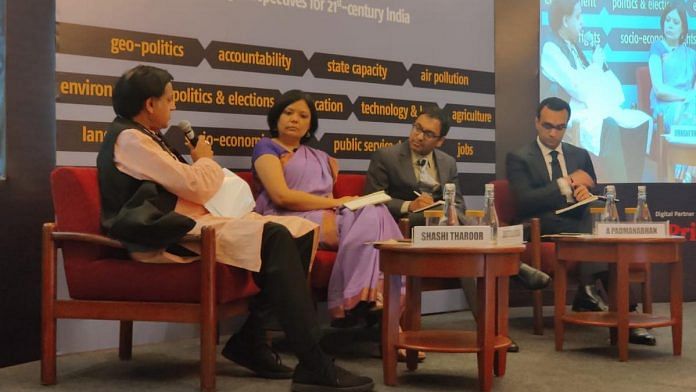New Delhi: Congress MP Shashi Tharoor criticised the Delhi Police’s use of facial recognition technology to identify “potential opposition protesters”, saying that it does not fit into the idea of a democracy.
“It turns out that the Delhi Police goes around filming anti-government protests and then feeds the footage into the AFRS in order to extract identifiable faces of protesters,” Tharoor said while referring to the ‘Advanced Facial Recognition Software’ (AFRS) that the police in the national capital use.
The Congress MP was speaking at the two-day conclave, ‘CPR Dialogues 2020: Policy Perspectives for 21st Century India’ Monday. The event is organised by the Centre for Policy Research (CPR).
The Delhi Police, Tharoor said, matched the faces against its database to identify and segregate a certain group of protesters, who were singled out as “miscreants who could raise slogans or banners” at Prime Minister Narendra Modi’s rally at the Ramlila Maidan last November.
Tharoor then pointed out that facial recognition technology is not regulated by any law in India. “I have no idea how identifying potential opposition protesters at a political rally squares with your idea of democracy, but it certainly doesn’t fit into mine,” he said.
The MP was delivering the opening keynote for a session on ‘Rights in times of AI: Emerging technologies and public law framework’ on the inaugural day of the event.
He was part of a panel that also comprised of Madhav Khosla, Associate Professor of Political Science at Ashoka University, and Smriti Parsheera, Fellow at the National Institute of Public Finance and Policy.
The panel was moderated by Ananth Padmanabham, Visiting Fellow, CPR.
Also read: Tech intervention in welfare schemes necessary, but requires social integration: Experts
‘Propensity to interfere with human rights’
Tharoor referred to instances to highlight the “positive potential” of Artificial Intelligence (AI) but said that it has “far greater propensity” to interfere with human rights.
For instance, he said that the right to equality and the prohibition of discrimination is “likely to be severly threatened with the widespread and rapid deployment of algorithmic decision making by companies that can perpetuate bias and result in discriminatory outcomes”.
He also said that AI poses a challenge to privacy rights, as well as other rights such as rights to freedom of expression and association.
“There are ominous dangers lurking in this area, such as data usage without consent, identification of individuals through data, biased data selection, discrimination in AI models and asymmetries in data aggregation, all of which could amount to huge violations of our right to privacy,” he explained.
This is why, he added, it is necessary to establish a suitable framework that can protect human rights in the current stages of AI development.
“It is terribly important that proper legal framework comprising significant provisions such as comprehensive data protection legislation, mandatory internal ethics policies for all companies using AI, all of this should be in place to regulate artificial intelligence to ensure that it does not become counterproductive and confront us with unmanageable implications,” he said.
Also read: Link Indian agriculture with global chains, liberalise agro-commodity markets: Experts
‘Societal implications of technology’
Tharoor further said that there should be focus on the “societal implications” of technologies being developed and deployed by industries and governments.
“In comparison to other technologies, the potential of artificial intelligence to both benefit and harm the common citizenry stands greatly enhanced,” he said. “There should therefore be effective structures and safeguards to prevent and mitigate all sorts of tribulations that may arise out of an AI system.”
He said that there was a need to find the “right balance” between technological development and human rights protection. Its development, he said, should involve “opportunities not threats” and that it should “strengthen human rights and not undermine them”.
As an example, he highlighted the impact of AI and automation on employment and said that it “may soon pose a threat to the right to work” and may lead to a situation where “the workforce finds itself redundant”.
Our objective, he said, should be “to ensure that while artificial intelligence may transform businesses and improve the future of work, which we should welcome, AI eliminates some tasks only and not jobs altogether.”
Also read: ‘Trade has been weaponised — India should lift tariffs on America’s Harley-Davidson bikes’
ThePrint.in is the digital partner for CPR Dialogues. Read this series of curtain-raiser articles ahead of the conference.




Does The Print being a digital partner of CPR Dialogues mean that it has to print everything that Shri Shashi Tharoor said in the programme and exclude all others? Is this responsible journalism?